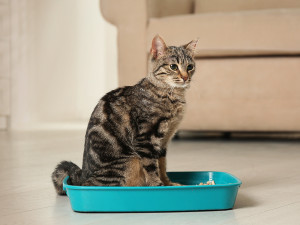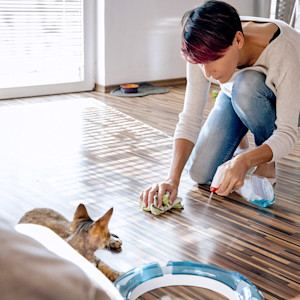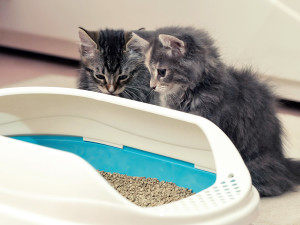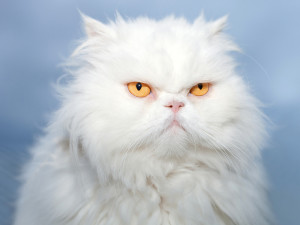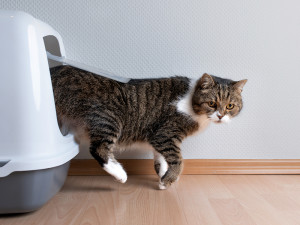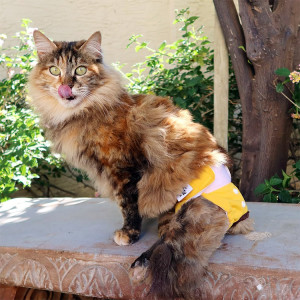Why Does Your Cat Pee on Your Bed?
It’s a clear sign something isn’t right.
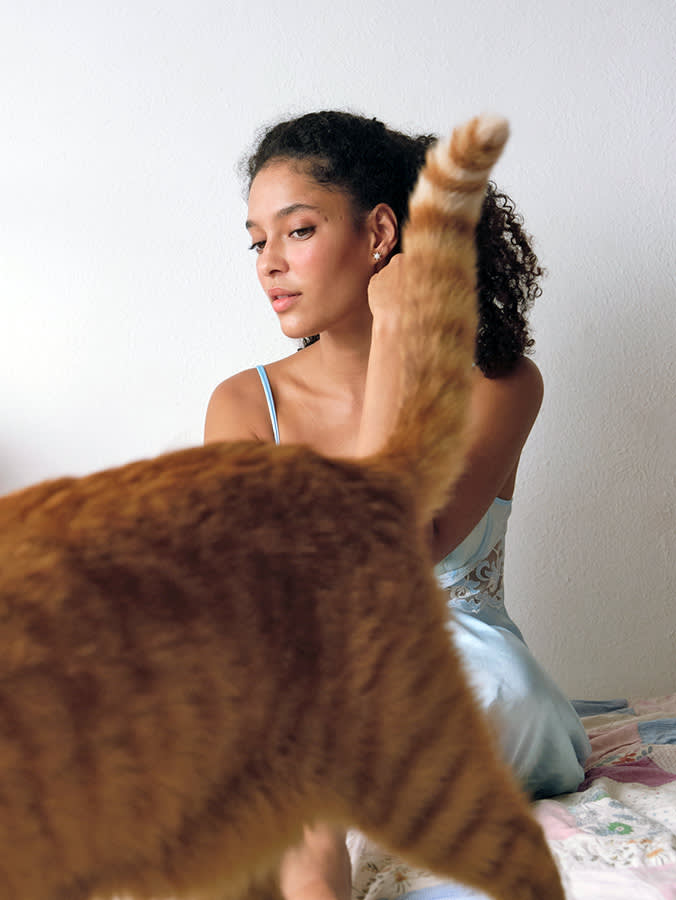
Share Article
In This Article:
Reasons Your Cat is Peeing on Your Bed When to Take Your Cat to the Vet How to Stop Your Cat From Peeing Where They Shouldn’t Frequently Asked Questions
One of the best things about sharing your life with a cat is not having to take them outside for a walk every time they need to pee. While puppy parents are bundling up for the cold or getting soaked by the rain, we cat people can be cozy on the couch, knowing our feline friends are just fine using their litter boxes when nature calls.
If you read that and thought, But my cat pees on my bed! then you’ve come to the right place. In spite of generally being conscientious and tidy about their litter box habits, sometimes cats pee where they shouldn’t — including your bed or your clothes.
Reasons your cat is peeing on your bed
There are many medical causes behind a cat peeing on your bed. The only way to determine the cause is through a veterinary exam and testing.

Medical issues
They have feline lower urinary tract disease (FLUTD).
A cat’s urinary system health can get a little complicated, so in veterinary medicine, there is a catchall term that’s used to describe many urinary issues in one neat package. FLUTDopens in new tab is a condition that covers many causes of urinary issues that all produce similar symptoms. This includes urinary tract infections, bladder stones and crystals, and idiopathic cystitis when we just don’t know what’s causing it. Symptoms of FLUTD can include frequent peeing, peeing outside the litter box, bloody pee, and straining or crying when peeing.
They have bladder stones or crystals.
What a cat eats and their overall urinary tract health can lead to the formation of stones or crystals in their urine. Sounds painful, right? Well, they are. Stones can even become lodged in the urethra, preventing a cat from urinating normally. Watch out for bloody urine, frequent urination and straining to pee or not being able to pee at all.
They have kidney disease.
The kidney’s main job is to filter the blood and regulate water balance. In cats with kidney disease, these functions can be greatly reduced, so instead of saving water to be used in their body, the kidneys just run it through, creating a lot of urine.
Cats can have a difficult time holding all of that urine in, causing them to pee in places other than the litter box. You’ll likely notice your cat drinking a lot of water, not eating as much, and having overly yucky breath.
They have diabetes.
Another major cause of lots and lots of urine is diabetesopens in new tab. This is when the pancreas fails to produce enough insulin or the body fails to respond to it properly. Because insulin is in charge of moving glucose from the blood into the cells of the body, cats with diabetes will have higher than normal blood glucose amounts. This glucose can then spill over into the urine where it attracts more water, increasing the amount of urine. As with kidney disease, the bladder can have a hard time holding all these fluids in, causing a kitty to pee where they lie so to speak.
They have arthritis.
An older cat who pees on your bed may have arthritis; creaky joints can cause difficulty getting in and out of the litter box. If you have a senior cat, try getting them a litter box with low sides, so it’s easier for them to manage.
They have urinary incontinence.
The urinary bladder has a nifty band of muscle that keeps it closed when a cat isn’t peeing and relaxes to release urine when a cat is ready. Injuries to the back that affect nervous function to that sphincter muscle, issues with the muscle itself, or inflammation in the urinary tract can all lead to leakage or urine, which could end up on your bed. Urinary incontinence can less commonly be caused by anatomical issues, such as ectopic ureters, where the tubes from the kidneys attach somewhere beyond the bladder sphincter.
They have bladder tumors.
Cancer of the bladder may have your cat peeing on your bed as well. Tumors in the bladder can cause irritation which disrupts normal function leading to symptoms similar to FLUTD and many other urinary tract issues. Bladder tumors can sometimes be treated with surgical removal and chemotherapy or radiation.
They are dealing with behavioral issues.
If your veterinarian is able to rule out medical causes for peeing on your bed, your kitty may be doing it because of a behavioral issue. These include:
Stress and anxiety
Our laidback couch potatoes can actually be little brewing stress monkeys. Changes in a cat’s environment, such as a move, the addition of a family member, or not getting enough exercise or attention, can throw a cat into a bit of a tailspin. They may pee on your bed as a way to get your attention so that you know just how unhappy they are.
Cognitive dysfunction
As some kitties age, their brain may undergo changes that have them forgetting where their litter box is or that they should be using it. Cats with cognitive dysfunctionopens in new tab may pee on your bed simply because they don’t know where else to go.
Urine marking
Urine can serve as a powerful messenger to other animals. It lets them know who this place or thing belongs to and when it was claimed. Some cats may spray urine as a way to mark their territory, especially if you’ve recently introduced a new cat into your home, or it could be a stress-related response, again as a way to get your attention. Urine marking is also more common in intact males and is used as a way to attract a mate.
Litter box issues
Cats can become pretty particular about their bathroom and if things aren’t up to par, they may choose to not use the litter box. Litter box issues may include:
Not clean enough
Cats love being clean and if their litter box is less than so, they’ll search out other options. Who could blame them? No one wants to be hit with a strong odor when they enter the bathroom and days-old cat urine and feces definitely creates a strong odor.
Not enough litter boxes
Some kitties really hate to share, especially when it comes to their bathroom. If you have more than one cat, make sure you have enough litter boxes to go around. The general rule is you should have the number of litter boxes that you have cats plus one. So, for three cats, you would want four litter boxes. This allows everyone to claim their own plus an extra should one become overly dirty or otherwise undesirable.
Litter box location
Your kitty may pee on your bed because they can’t get to their litter box. While none of us want a litter box out in the open in view of company, putting it behind a closed door can mean your kitty may get locked away from it. Put your cat’s litter box in an out of the way area but also one where they can’t be denied access to it.
Litter box accoutrements
Along with the cleanliness, some cats can get very particular about the box and the litter itself. Texture, size and scent all vary among different cat litter brands. So do the size and type of litter box. If your kitty would prefer an unscented litter and you pour in something with a strong floral scent, they may object and pee on your bed instead. If your cat doesn’t like confined spaces and you give them a covered litter box, they may pee out in the openness of your sleeping space.
When to take your cat to the vet
Peeing on your bed is abnormal, so you’ll want to see a vet as soon as your cat starts doing it.
How to stop your cat from peeing where they shouldn’t
Consult a vet.
First thing’s first, see your veterinarian. Peeing outside the litter box can stem from a variety of health issues, which your vet can help you wade through. So, if your cat has started peeing on your bed, get to the vet first.
Improve the litter box situation.
Scooping the litter box daily and completely dumping and washing the box at least weekly are musts if you want your cat to be content with their litter box. Take note of your cat’s preferences and adjust the litter box to match. This may take some trial and error but it’s well worth it to save your comforter.
Place the litter boxes off the beaten path — but not so out of the way that your cat has to hunt for them. Don’t put them behind closed doors and make sure there’s at least one on every level of your home.
Work on training and behavior modification.
Sometimes, cats may need a little encouragement to use their litter box again. You can try attracting them to it by sprinkling catnip around it. Also, reward them when they use it with treats and love. Don’t ever punish your cat for peeing on your bed as this may make them stressed and fearful, which as we’ve learned, may only make the problem worse. Speak to your vet or a professional trainer if you need more advice.
If your cat just can’t get onboard with a litter box, consider training them to use the toilet.
Create a stress-free environment.
Because stress can be a major player in your cat peeing on your bed, try to reduce their stress as much as possible. Stick to a regular feeding schedule and try to get home at the same time every day. Offer them plenty of opportunities to exercise and stimulate their mind through games and toys. Cats also need one-on-one attention every day to feel as if they belong.
If you’re having trouble achieving a Zen environment, look into pheromone diffusers or sprays to help promote calmness.
Bottom line
No one wants to deal with the messiness and frustration of a cat peeing on your bed, your cat included. Peeing on your bed is typically a sign that something is wrong with your cat.
Health conditions, behavioral issues, or litter box problems may all be to blame for your cat peeing on your bed.
Start by seeing your veterinarian to rule out health conditions. They may also be able to help you work through behavioral problems and give you pointers on how to improve your cat’s litter box and living situation to stop them from peeing on your bed.
FAQs
Can a UTI cause a cat to pee outside the litter box?
A UTI can certainly cause your cat to pee outside their litter box — whether that’s on your bed, your dog’s bed, the rug, or anyplace else. If your cat randomly pees on your bed, your veterinarian will likely test for a UTI, along with checking to see whether another medical issue is at play.
How can I house train my cat?
House training a cat is much easier than teaching a puppy the ropes of proper peeing and pooping. Cats are generally easy to house train; they seem to know what to do instinctively. Choosing the right litter box, trying out different types of kitty litter until you find one that works for your cats (and for you!), and keeping your cat’s litter box clean are all keys to effective litter box training.
Why does my cat pee outside their litter box?
If you’ve ruled out medical issues and your car is still peeing outside the litter box, take a look at where the litter box is located, how clean it is, and how many cats are using it. Cat behaviorist Stephen Quandtopens in new tab goes by the “N+1 rule,” which means having one litter box for each cat in your household, plus one extra.
References
“Cognitive Dysfunction.” Cornell Feline Health Center. https://www.vet.cornell.edu/departments-centers-and-institutes/cornell-feline-health-center/health-information/feline-health-topics/cognitive-dysfunctionopens in new tab.
“Feline Diabetes.” Cornell Feline Health Center. https://www.vet.cornell.edu/departments-centers-and-institutes/cornell-feline-health-center/health-information/feline-health-topics/feline-diabetesopens in new tab.
“Feline Lower Urinary Tract Disease (FLUTD).” American Veterinary Medical Association. https://www.avma.org/resources-tools/pet-owners/petcare/feline-lower-urinary-tract-diseaseopens in new tab.
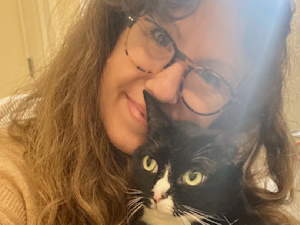
Elizabeth Laura Nelson
Elizabeth Laura Nelson is a writer and editor based in Brooklyn, New York, whose work has appeared in The New York Times, Jenny, Best Life, YourTango, Elite Daily, and more. She focuses her work on relationships, health and wellness, midlife, and lifestyle. As a child, Elizabeth was scared of cats (claws and teeth, yikes) but she has since gotten over her fear and now shares her home with three sweet and gentle feline companions who make life better (and cuddlier) every day.

Dr. Chyrle Bonk, DVM
Dr. Chyrle Bonk has been a mixed-animal veterinarian since 2010, with a special interest in rehabilitation. When she's not practicing or writing about veterinary medicine, you may find her exploring the outdoors with her family or tending to her cows, horses, chickens, or cats and dogs.
Related articles
![Two cute kittens are sitting near their litter box.]()
Best Odor-Control Cat Litter
A necessity, really.
![the colorful litter]()
PrettyLitter Has Beauty and Brains
At long last, a litter that’s for more than just scooping.
![White Persian cat on a blue background]()
UTIs Suck for Your Cat, Too
Here’s how to help them get relief.
![cat coming out of litter box]()
What to Do When Your Cat Refuses to Be (Litter) Boxed In
An expert explains why kitties are so particular about where they pop a squat.
![Large orange cat wearing a diaper.]()
The Best Diaper Options for Kittens in 2024
Plus, all your kitten-diaper questions answered (we know you have them).
Why Does My Cat Pee on My Clothes?
Now, that’s no one’s preferred perfume scent.

